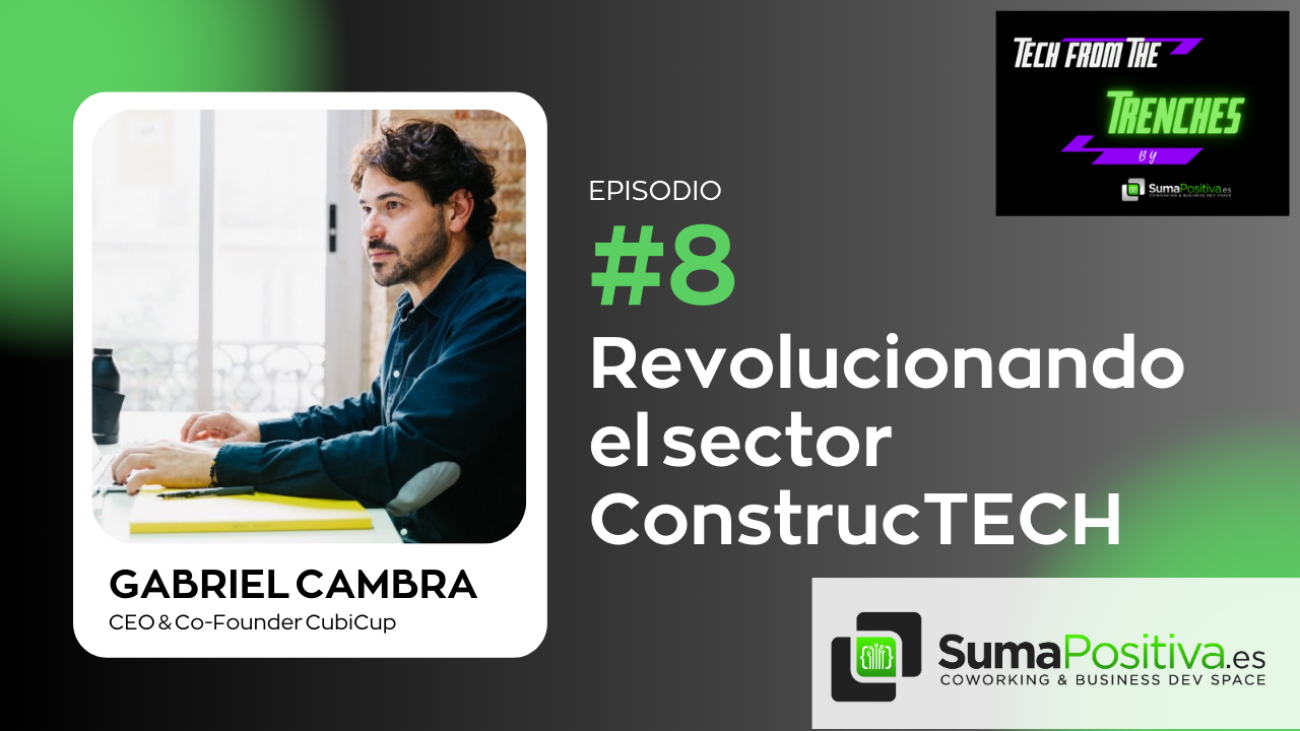Gabriel Cambra, a civil engineer graduated from the Polytechnic University of Valencia and CEO of CubicUp, a sustainable neoconstruction company with the goal of making a mark in this industry, shares his entrepreneurial story with us.
Gabriel always had a desire to venture into the digital realm, although he gained extensive experience working in architecture firms and large construction companies. He participated in engineering projects in countries such as Algeria (Algiers), England, France, and Colombia.
What is CubicUp?
CubicUp initially started as a marketplace for renovation projects, but over time they realized they wanted to have complete control over the user experience. Thus, they took the step to become a specialized neoconstruction company focused on renovations.
Precise design is one of the key aspects, as there is a lack of information about actual costs in this field. Through the use of BIM 360 technology, CubicUp standardizes and customizes both comprehensive and urban core renovations.
Enrique and Bruno asked him some questions:
There aren’t many technology-based projects in the construction sector. What is the reason for this?
The lack of projects in the construction sector can be attributed to several reasons. One of them is that digitization in this field has followed a wave-like process, meaning it has been gradual and based on the complexity of tasks.
If we talk about waves, we could mention the first wave of digitization, which focused on sectors like tourism, takeout food, etc. In a second wave, we saw digitization in sectors such as freelance work, Fintech, Insurtech, and Proptech.
In the construction sector, digitization has become more challenging due to the need to rely on various SaaS (Software as a Service) technologies. Companies can utilize these platforms to integrate and focus on the core areas that need to be digitalized.
Although significant effort is required to digitize the construction sector, it is a process that the industry is gradually adopting, and it is part of that third wave of digitization where there are significant opportunities.
As technology continues to advance and specific solutions for the sector are developed, we are likely to see an increase in digitization and the implementation of new tools and processes in the construction industry.
What technologies do you see that can help accelerate this third wave?
To accelerate this third wave of digitization in the construction industry, Gabriel emphasizes the fundamental role of Building Information Modeling (BIM) technology, which enables efficient management through the creation of digital twins. Specifically, in the realm of PropTech, the impact of BIM will be significant.
The use of BIM goes beyond 3D renders. It allows for the standardization of the entire project development process, providing numerous benefits, such as:
a) Calculation of carbon footprint: BIM enables the accurate and efficient calculation of a project’s carbon footprint.
b) Detailed information in each module for price optimization: Each component of a project can be parameterized in BIM, providing precise and detailed information for price and resource optimization.
c) EPD (Environmental Product Declaration) sheets with certified CO2 emissions: BIM facilitates the generation of EPD sheets that provide information on environmental impact, including certified CO2 emissions. This helps make informed and sustainable decisions.
d) Energy efficiency and reduced environmental impact: Through BIM, all construction processes can be optimized to minimize CO2 emissions. Gabriel highlights that, on average, a renovation carried out by CubicUp has a 30% lower environmental impact in terms of CO2 emissions.
Gabriel gives an example of the importance of working with high-quality window suppliers, as windows have a significant impact on energy efficiency and emission reduction. In summary, BIM technology plays a key role in accelerating digitization in the construction industry, enabling more efficient and sustainable project management
What challenges does the construction industry face?
Despite the challenges, Gabriel has a very positive outlook on the construction industry. Socially and professionally, the boom experienced in 2008 has led millennials, who are now buying their first homes, to seek renovations. These new homeowners desire a more digital experience in the construction and renovation process. Additionally, there is also a greater presence of young and conscious professionals with well-developed technological skills and habits in the field of renovations.
Despite the competitive challenges and talent demands, the positive perspective and increasing adoption of digitalization in the construction industry suggest a prosperous future for the sector.
Dependency on third parties in terms of deadline control?
Dependency on third parties for deadline control is a significant challenge in the construction industry. Unlike the construction industry, which has experienced a higher degree of industrialization, the renovation process still largely relies on artisanal methods. In the case of CubicUp, they have developed an execution manual that relies on efficient guilds aligned with the working methodology promoted by Gabriel and his team.
To maximize efficiency and replicability, CubicUp seeks specific project typologies. Additionally, they employ a collaborative Lean construction methodology that involves artisans throughout the renovation process. This methodology fosters active participation and collaboration among all involved in the project, helping streamline deadlines and optimize execution.
Although the construction sector has traditionally been closed and heavily relied on third parties for deadline control, the implementation of methodologies like Lean Construction and future industrialization have the potential to reduce this dependency and improve efficiency in construction and renovation projects.
Is it good to train your people?
Training our team is essential to us. We have a team of 23 people, and our challenge is to be better leaders and maintain a strong corporate culture in which employees believe in the project. It’s something we must constantly work on.
To achieve this, we consider it essential to have clear and defined company values. During the hiring process, we pay special attention to the alignment of candidates with these values. Additionally, it is important for our project to be inspiring, and for employees to see a path and opportunities for growth. As a startup presenting ourselves as a sustainable NeoConstructor disrupting the sector, challenges become more enriching and appealing.
We never stop emphasizing the importance of continuous learning and growth. Moreover, we foster a collaborative learning environment where team members can share knowledge and experiences.
Artificial Intelligence. What impact do you see?
Artificial Intelligence (AI) is having a significant impact on our industry. I am optimistic in this regard and see great opportunities that AI can offer. At CubicUp, we are working with generative systems that allow us to generate more efficient and optimized alternatives for our projects.
AI gives us the ability to thoroughly analyze and evaluate all possible alternatives, which helps improve decision-making in project planning and execution. Additionally, in the marketing domain, AI enables us to generate visually appealing variations, contributing to a more impactful presentation of our projects.
On the construction side, AI is also being used to connect with more predictive systems. Advanced AI systems exist that enhance project monitoring, enabling greater efficiency in project management and control. Furthermore, each house or project has a specific model used to train and generate data that feeds the AI system.





